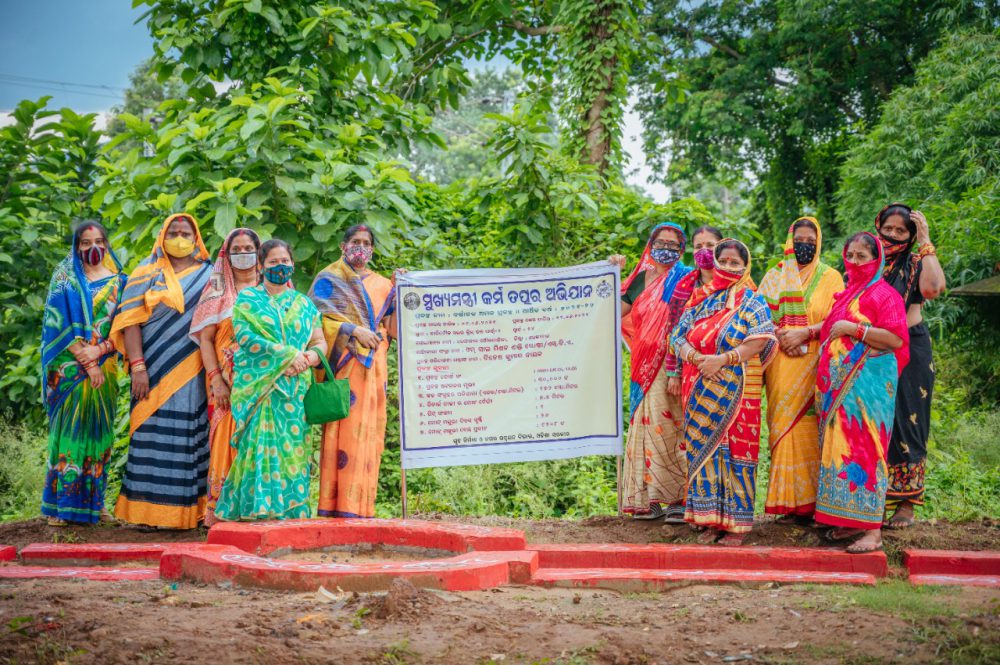Bhubaneswar: A vibrant and effective partnership between Mission Shakti Self Help Groups (SHGs) and the Housing and Urban Development Department (H&UDD) is now driving the community-centric and women-led urban development model in the State.
The shift in government focus from a contractor driven to a community engagement model has resulted in empowering more than 16,000 Mission Shakti Women SHGs and other vulnerable groups in the State.
The groups are now involved both in service delivery and as implementing partners in a range of urban development programs – from solid and liquid waste management, water supply to subsidized meal program and livelihood generation.
“Community engagement in urban services delivery through Mission Shakti Women SHGs is now a non-negotiable agenda. It has led to women-led community initiatives across programs, socio-economic empowerment of women and entrepreneurship development for an emerging economy,” said Housing and Urban Development Minister Pratap Jena.
More than 13,500 Mission Shakti SHGs are now engaged as Implementing Partners and Implementing Agencies in executing the urban employment generation scheme Mukhyamantri Karma Tatpar Abhiyaan (MUKTA). It is a community driven scheme tailor made for women SHGs to take the center stage where projects up to Rs 10 lakh are being executed directly through Mission Shakti groups and their federations as Implementing Agencies.
Various projects under MUKTA have been successfully implemented through Mission Shakti groups such as city beautification and open space development across 114 ULBs of the State over last 15 months. Importantly, the SHGs have been instrumental in creating 10,000 rainwater harvesting structures recently across the State.
In addition, to enable the Mission Shakti groups to execute development projects under the MUKTA program they would now be given credit support up to Rs 3 lakh towards working capital with zero interest rate.
Mission Shakti SHGs and transgender groups have also been integrated across decentralized solid and liquid waste management value chain in a big way in Odisha, emerging as key service providers in sanitation. A total of 2,378 SHGs are now engaged in solid waste segregation, collection, transportation, treatment, reuse and disposal as per standardized norms. Besides being engaged as Swacha Supervisors, Swacha Sathis, they are also operating and managing Battery Operated Vehicles (BOVs) and Micro Composing Centres (MCCs), Micro Recovery facilities and Construction and Demolition (C&D) Waste Management Plants. Likewise, they also collect user fees and assist in selling the ‘Mo Khata’ – the manure prepared from treated solid waste.
Odisha has taken a big leap by handing over the operation and maintenance of Septage Treatment Plants (SeTPs) to women and transgender SHGs in 9 cities ensuring their socio-economic empowerment. The groups have been successfully managing the treatment facilities since a year, with 35 more such groups being currently trained to manage 34 newly operational plants. The SHGs are also managing more than 150 Community and Public toilets across the State and have also been operating cesspool vehicles for safe emptying and transportation of toilet waste in a few cities.
“For the first time in Country, women and transgender SHGs are now managing SeTPs at par with their male and technical counterparts,” said Jena.
The Department has also partnered with Mission Shakti SHGs for the Sujala program or the Drink from Tap Mission to support in 100% house connections and customer management. The members known as Jalasathis sensitize public on safe water and health, take monthly meter readings, raise online user charges bills, collect payments digitally from consumer’s doorsteps and facilitate consumer complaint redressal from communities. While at present a total of 222 Jalasathis are engaged in 5 ULBs, additional 336 will be deployed in 70 ULBs very soon.
The women collectives are also successfully managing Aahaar Kendras which provides subsidized meals for the urban poor. A total of 157 SHGs are partnering in managing Aahaar Kendras with six SHGs engaged as end-to-end partners.
The successful partnership between the H&UDD and the Mission Shakti urban SHGs have not only provided wide ranging livelihood opportunities for women and other vulnerable sections but also enhanced their leadership and managerial skills. Each SHG member engaged now earns between Rs 4000 – 10, 000 per month through this collaboration.
In order to smoothly and efficiently integrate Mission Shakti SHGs in key urban programs, ULB functionaries are regularly oriented to provide opportunities to the members to participate and contribute to the urban infrastructural development in their local areas. The State Urban Development Agency (SUDA) regularly organizes capacity building programs for the groups.
The Odisha model of community engagement in urban development has taken women empowerment to a higher orbit from traditional unskilled/semiskilled economic activities to high-end technical and managerial activities, emerging as an exemplar for other states.


